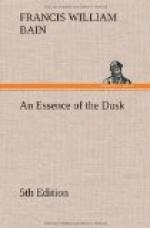tree: beautifully dressed, blazing with jewels,
and adorned with saffron and antimony, betel, indigo,
and spangles, flowers, minium, and henna, bangles on
ancle and comb in her hair. And she said to that
Rajpoot, who was as utterly astounded by the sight
of her as if she had been water in the desert:
O son of a king, succour one who is utterly without
resource. And when he asked her, what was the
matter, she said: I was the only wife of a very
rich merchant, and as we travelled from the South,
suddenly we were set upon by a band of Thags.
And after killing every one but me[25], they all went
to sleep, thinking me secure; but in the middle of
the night, I went a little way, and hid myself in
a hollow tree. And in the morning, those villains,
after hunting for me in vain, all went away, fearing
a pursuit, and I came out of the tree trembling, and
reached this road, and now I am alone in the world.
Then said the Rajpoot to himself: Ha! so, after
all, I have found my treasure, and that excellent ascetic
was a true prophet. And he said: O lady,
I am of good family. And now, if thou wilt have
me for a husband, I will supply the loss of thy merchant,
and all the rest of thy relations. And she feigned
reluctance: but after a while, she dried her
tears, and consented. But that Rajpoot almost
went out of his mind, so great was his delight.
And one day he told her of Waranasi, and the burning
of Kashayini. And she looked at him with laughing
eyes, and said: O my husband, I will make up to
thee for the loss of Kashayini: for I am just
as beautiful as she.
[20] In all Oriental stories, statements
are proved not by Aristotelian syllogism, but by
“instances:” and we are reminded
of the opinion of the artful Retz, that “one
never persuades anybody, but anybody can insinuate
anything.”
[21] Benares. The lady in question
was one of those Hindoo
Aspasias of whom many similar stories
are told.
[22] Which we might translate Aromatic:
it includes the
ideas of red colour and pungent
perfume.
[23] Or, as we say, castle in the
air.
[24] A regular trade in medieval
India.
[25] Everything in this story is
exactly in harmony with
the manners of medieval India.
The Thags often preserved a
woman for her beauty, when they
murdered every one else.
X.
And as Natabhrukuti ended, she leaned forward, and
gazed at Aja with soft seductive eyes, till he blushed,
and wavered before her like the flame of a candle
in a wind. For her beauty bewildered him, and
her cunning story planted, as if against his will,
a seed of suspicion in his mind. And in spite
of himself, he said to himself: What if it were
as she says, and my wife, like another Kashayini, were
concealing from me something that she shrank from
avowing, lest I should think the worse of her.




